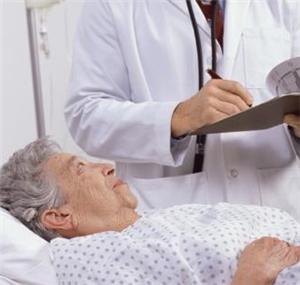Why Did the Doctor Run Away?
February 13, 2009 by Viki Kind
Filed under For Patients & Families
Dear Viki,
“The doctor stopped coming into my grandpa’s hospital room and never came back to check on him. Luckily the nurse was there and helped our family as we didn’t know what to do. Viki, why did my grandpa’s doctor run away when my grandpa was dying?”
Maybe the doctor didn’t really “run”, but to the family, it felt like the doctor ran away and became invisible as the end approached. I don’t think doctors mean to do this, but unfortunately, doctors can be uncomfortable around death.
I know, you’re saying, “How can that be?” Well, it is easy. Those who are drawn to medicine and want to become a doctor are those who want to heal and to save. Nobody becomes a doctor to help people die. But unfortunately patients do die and doctors would rather not be a part of it. Unless they get specialized training, their discomfort with death doesn’t go away. Luckily, the young doctors coming out of medical school are getting better training regarding taking care of the dying.
Thank goodness for the nurses who take such good care of our loved ones as they die. Sometimes the best we can do for our loved ones is to have a good nurse, a good chaplain and a good social worker to make the experience a little better. Over the next few months, I will be discussing the concept of a “good death” in greater detail.
Feel free to contact me with your death and dying questions.
How Do You Want to Die?
February 5, 2009 by Viki Kind
Filed under For Patients & Families
 Your doctor comes into the exam room or your hospital room and asks you, “Do you want us to do CPR?” (CPR meaning cardiopulmonary resuscitation or bringing you back to life after you have died or as some doctors brutally put it, “pounding on your chest.”) What would your answer be?
Your doctor comes into the exam room or your hospital room and asks you, “Do you want us to do CPR?” (CPR meaning cardiopulmonary resuscitation or bringing you back to life after you have died or as some doctors brutally put it, “pounding on your chest.”) What would your answer be?
I’ve asked many groups of doctors, “How many of you would like to die by CPR?” And no doctor ever, ever raises their hand. What is it that they know that they’re not telling us? They know that the chance of CPR working is minimal, sometimes even 0%. But they don’t tell you this. They don’t tell you that it’s not like on the television show ER. On ER, CPR works about 80% of the time. In real life, if you’re healthy, CPR works about 15 to 20% of the time. And if you are close to death, CPR works less than 1% of the time and will prolong your suffering.
Now just to be clear, CPR does work well if you’re a fairly healthy person having a sudden heart attack. To illustrate this point, one hospital told me that it would be best if CPR was only done on visitors who dropped dead from a heart attack. Of course that was said as a joke, but the people in the hospital understood that there was some truth in it.
The other thing they don’t tell you is that it can be brutal. You may be brought back to life but in a worse condition than before both mentally and physically. Or that you and your family won’t have the opportunity for a peaceful and profound death experience. When you picture the last minutes of your life, do you see strangers straddling you on a bed, thumping on your chest, all alone, while your family waits outside the door? Or do you see a time with family and friends gathered around the bedside, perhaps with music being played or prayers being said or words of love being expressed?
I don’t know about you but I know what I want. I want a peaceful and dignified death.
A profound death is the choice you’re not being offered because the doctor is not asking you enough questions. Okay, they should ask you about CPR, just in case you’re one of the few lucky ones that will benefit, but there is more to be asked. They should also ask, “How can I respect you and help you as you die?”
But doctors don’t ask this. Why? Because they are afraid of death, because they care too much about you and they don’t want you to die, and because they don’t want to fail. I can understand that doctors have good reasons for not talking about death. Good reasons because they’re good people with caring hearts. But these reasons can get away in the way of us having the opportunity to determine how we want to die.
So what can we do? When the doctor says, “Would you want CPR?” give him your answer and then tell him that there are other things he should know about where and how you would want to die too. Now some doctors won’t even ask you the CPR question because they want to avoid the topic so you are going to have to begin the conversation. You’re going to have to teach the doctor to be brave and to be willing to talk with you. You’re going to have to ask for clear answers and for the support you need. And if you find your doctor won’t talk to you, find a different doctor who will. And if after talking with your doctor, you realize they don’t respect or support your choices, find a different doctor who will.
You deserve a good death.
Got a question? Ask Viki.
How Can the Doctor Ask Me to Kill My Mom?
January 30, 2009 by Viki Kind
Filed under Featured, For Patients & Families
 The doctor just told you that you have difficult decisions to make. She said that you have to decide if it is time to let your mom die. Do you want us to take your mom off the ventilator? Would your mom want CPR? How can you decide? Well I have a gift for you. It is not your decision. It is your loved one’s decision. You are just the representative of the patient and are supposed to be speaking as if you were the patient themselves. You are supposed to use the values of the patient, not your values.
The doctor just told you that you have difficult decisions to make. She said that you have to decide if it is time to let your mom die. Do you want us to take your mom off the ventilator? Would your mom want CPR? How can you decide? Well I have a gift for you. It is not your decision. It is your loved one’s decision. You are just the representative of the patient and are supposed to be speaking as if you were the patient themselves. You are supposed to use the values of the patient, not your values.
Here is where your mom’s doctor went wrong. The doctor should have asked, “What would your loved one be telling us if they were able to speak right now? What would your mom say about wanting CPR? Would your mom want to continue on like this? These are the right questions. But instead the doctor burdens us by making it seem like it is our choice. But it shouldn’t be our choice. We are the surrogate decision maker, the substitute just filling in for the patient. Different states call it different things: durable power of attorney, agent, proxy or surrogate. But no matter what we call it, the rules are the same. You are supposed to honor the patient’s wishes,
I know the doctors never told you this before. But let me explain how it works, it is something called the substituted judgment standard. We are supposed to speak with the voice of the patient. As the decision maker, you are supposed to think about everything you know about the patient, what they have told you in the past, what their values are and what is important to them. Then using this information, do your best to make the decision you think they would make.
What if after considering all of this, you realize your mom would say, “I don’t want to live like this, I would rather die.” Then you have to tell the doctor the truth. I can hear you saying, “But I don’t want her to die.” Of course you don’t. But you have a job to do and it is up to you to be brave. You need to do the respectful and loving thing and tell the doctor what she would say even if it is not what you would choose yourself. This is the gift you can give your loved one by speaking for them one more time. Otherwise you are betraying your loved one and disrespecting their beliefs and their life. I am not saying this is easy to do, but it is the right thing to do. And usually doing the right thing is doing the hardest thing.



